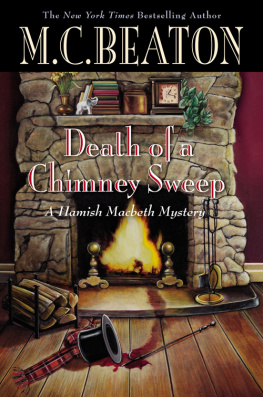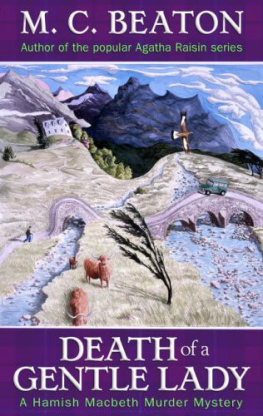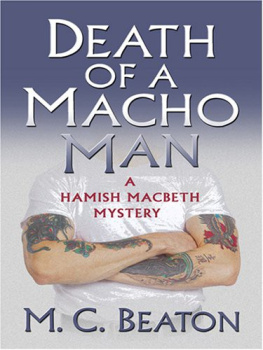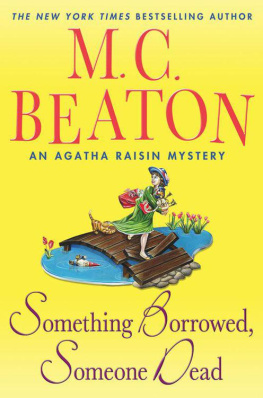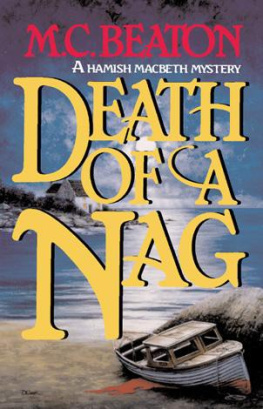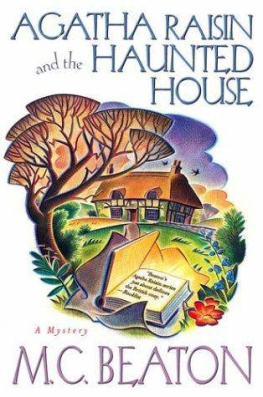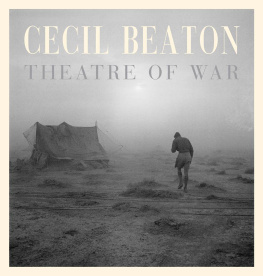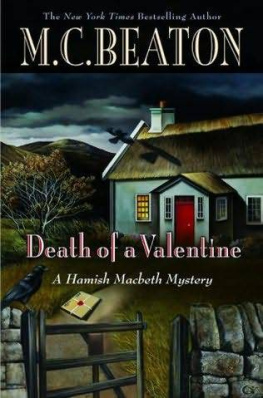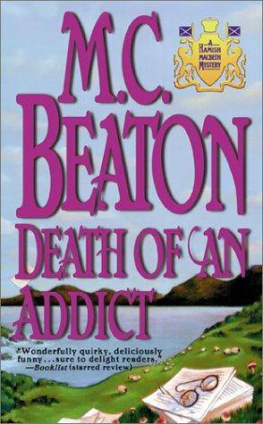M. C. Beaton - Death of an Outsider
Here you can read online M. C. Beaton - Death of an Outsider full text of the book (entire story) in english for free. Download pdf and epub, get meaning, cover and reviews about this ebook. year: 2008, publisher: Constable & Robinson, genre: Detective and thriller. Description of the work, (preface) as well as reviews are available. Best literature library LitArk.com created for fans of good reading and offers a wide selection of genres:
Romance novel
Science fiction
Adventure
Detective
Science
History
Home and family
Prose
Art
Politics
Computer
Non-fiction
Religion
Business
Children
Humor
Choose a favorite category and find really read worthwhile books. Enjoy immersion in the world of imagination, feel the emotions of the characters or learn something new for yourself, make an fascinating discovery.

- Book:Death of an Outsider
- Author:
- Publisher:Constable & Robinson
- Genre:
- Year:2008
- Rating:5 / 5
- Favourites:Add to favourites
- Your mark:
- 100
- 1
- 2
- 3
- 4
- 5
Death of an Outsider: summary, description and annotation
We offer to read an annotation, description, summary or preface (depends on what the author of the book "Death of an Outsider" wrote himself). If you haven't found the necessary information about the book — write in the comments, we will try to find it.
Death of an Outsider — read online for free the complete book (whole text) full work
Below is the text of the book, divided by pages. System saving the place of the last page read, allows you to conveniently read the book "Death of an Outsider" online for free, without having to search again every time where you left off. Put a bookmark, and you can go to the page where you finished reading at any time.
Font size:
Interval:
Bookmark:
Title:
Death of an Outsider
Series:
The third book in the Hamish Macbeth series
Author:
by M.C. Beaton
Year:
1988
Synopsis:
Nobody in the cloistered Highlands town of Cnothan, where Constable Macbeth is on temporary duty, had liked the abrasive Englishman, William Mainwaring, and now that hes been murdered no one much minds.
See, the happy moron,
He doesnt give a damn,
I wish I were a moron,
My God! perhaps I am!
Anonymous
C onstable Hamish Macbeth sat in the small country bus that was bearing him away from Lochdubhaway from the west coast of Sutherland, away from his police-station home. His dog, Towser, a great yellowish mongrel, put a large paw on his knee, but the policeman did not notice. The dog sighed and heaved itself up onto the seat beside him and joined his master in staring out of the window.
The bus driver was new to the job. Nae dugs on the seats, he growled over his shoulder, determined not to be intimidated by Hamishs uniform. But the constable gave him a look of such vacant stupidity that the driver, a Lowland Scot who considered all Highlanders inbred, decided it was useless to pursue the matter.
Misery did make Hamish Macbeth look dull-witted. It seemed as if only a short time ago he had been happy and comfortable in his own police station in Lochdubh, and then orders had come that he was to relieve Sergeant MacGregor at Cnothan, a crofting town in the centre of Sutherland. In vain had he invented a crime wave in Lochdubh. He was told that protecting the occasional battered wife and arresting a drunk once every two months did not amount to a crime wave. He was to lock up the police station and go by bus, for Sergeant MacGregor wished his stand-in to keep his car in running order.
Hamish hated change almost as much as he hated work.
He had the tenancy of some croft land next to the police station at Lochdubh, where he kept a small herd of sheep, now being looked after by a neighbour. He earned quite good money on the side from his small farming, his poaching, and the prize money he won for hill running at the Highland Games in the summer. All that he could save went to his mother and father and brothers and sisters over in Cromarty. He did not anticipate any easy pickings in Cnothan.
Crofters, or hill farmers, always need another job because usually the croft or smallholding is too small a farm to supply a livelihood. So crofters are also postmen, forestry workers, shopkeepers, and, in the rare case of Hamish Macbeth, policemen.
It was the end of January, and the north of Scotland was still in the grip of almost perpetual night. The sun rose shortly after nine in the morning, where it sulked along the horizon for a few hours before disappearing around two in the afternoon. The fields were brown and scraggly, the heather moors, dismal rain-sodden wastes, and ghostly wreaths of mist hung on the sides of the tall mountains.
There were only a few passengers on the bus. The Currie sisters, Jessie and Nessie, two spinster residents of Lochdubh, were talking in high shrill voices. Amnt I just telling you, Nessie? came the voice of Jessie. I went over to the Royal Society for the Prevention of Cruelty to Animals at Strathbane last week and I says to the mannie, I want a humane trap to catch the ferret that has been savaging our ducks. He gives me the trap, and he says, You take this here humane trap, and you humanely catch your ferret, and then, if you want my advice, you will humanely club the wee bastard to death. Sich a going-on! And him supposed to be against cruelty. I have written to our Member of Parliament to complain most strongly.
You told me a hundred times, grumbled Nessie. Maybe he was right. For all you caught in that humane trap was the ministers cat. Why dont you tell Mr. Macbeth about it?
Him! screeched Jessie. That constable is a poacher and it was probably his ferret.
The bus jerked to a halt and the sisters alighted, still quarrelling.
Three months in Cnothan, thought Hamish, absentmindedly scratching Towser behind the ears. They say Lochdubh is quiet, but nothing ever happens in Cnothan, and nothing ever will. Did I not have the two murders in Lochdubh?
He thought of the murder that had taken place last summer and how it appeared to have brought him closer to the love of his life, Priscilla Halburton-Smythe. But Priscilla, the daughter of a local landowner, had then left, just before Christmas, to go to London to find work. She never stayed away for very long. She might even be heading north now, and would return to Lochdubh to find him gone.
And she will not be caring one little bit! said Hamish suddenly and loudly. The bus driver bent over the wheel and congratulated himself on his decision to leave this crazy copper alone. Hamish knew Cnothan and thought it must be the dullest place in the world. Although designated a town, it was about the size of a tiny English village. He remembered the inhabitants as being a close, secretive, religious bunch who considered anyone from outside an interloper.
At last, he was the only passenger left on the bus. The bus lurched and screeched around hairpin bends, finally racing out of the shadow of the tall pillared mountains to plunge down into the valley where Cnothan stood, in the middle of Sutherland.
Hamish climbed down stiffly and collected his belongings, which were packed into a haversack and an old leather suitcase. The bus departed with a roar and Hamish pushed his peaked hat back on his fiery hair and looked about him.
High noon in Cnothan, he muttered.
It was the lunch-hour, which meant all the shops were closed and the main street was deserted. A savage wind screamed down it. Not even a piece of scrap-paper was borne on the wind. The town had a scrubbed, grey, anti-septic look.
Cnothan stood on the edge of an artificial loch caused by one of the ugliest hydroelectric dams Hamish had ever seen. What you saw was what you got. There were no quaint lanes or turnings. One straight main street led down to the loch. There were four grocers shops, which all sold pretty much the same sort of goods, a hardware, a garage, a craft shop, a hotel, a fish-and-chip shop, a butchers, a pub, and an enormous church. The government-subsidized housing was tucked away on the other side of the loch, segregated from Cnothans privately owned houses, which were all very small and drab and looked remarkably like the government ones.
The town was so barren, so empty, it reminded Hamish of scenes in a science-fiction movie he had once seen.
And yet he was aware of eyes watching him, eyes hidden behind the neatly drawn lace curtains.
He opened the garden gate of the bungalow nearest him, called Green Pastures, and went up and rang the brass ships bell that hung outside the door. Silence. A plaster gnome stared at him from the garden and the wind moaned drearily.
A mail-order magazine protruded from the garbage bin beside the door. Hamish twisted his head and read the name on it. Mrs. A. MacNeill. At last he heard footsteps approaching. The door was opened a few inches on a chain and a womans face peered through the crack, one of those sallow Spanish types of faces you find in the Highlands of Scotland.
What is it! she demanded.
Now Hamish knew in that instant that the woman knew exactly who he was. Her manner was too calm. For in a relatively crime-free area, the arrival of a policeman on the doorstep usually creates terror because it means news of a death or accident.
I am Constable Macbeth, said Hamish pleasantly, come to replace Mr. MacGregor who is going on holiday. Where is the police station?
I dinnae ken, said the woman. Maybe its up the hill.
At the top of the main street? asked Hamish. He knew the woman knew perfectly well where the police station was, but Hamish was an incomer, and in Cnothan, you never told incomers anything if you could help it.
Next pageFont size:
Interval:
Bookmark:
Similar books «Death of an Outsider»
Look at similar books to Death of an Outsider. We have selected literature similar in name and meaning in the hope of providing readers with more options to find new, interesting, not yet read works.
Discussion, reviews of the book Death of an Outsider and just readers' own opinions. Leave your comments, write what you think about the work, its meaning or the main characters. Specify what exactly you liked and what you didn't like, and why you think so.

